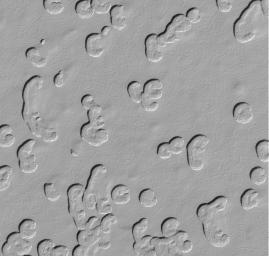
|
Martian South Polar Cap Close-Up
- Click the image above for a larger view
- Full-Res JPEG (2016 x 1920) (549.8 kB)
- Full-Res TIFF (2016 x 1920) (2.8 MB)
Caption:
This picture, illuminated by sunlight coming from the upper left, shows some of the variety of surface textures observed on the south polar residual cap. Here, the upper surface is dotted with a combination of polygonal patterns created by shallow troughs and large, almost circular pits formed by collapse. No one knows exactly how the large arcuate and circular pits are formed, but they appear to result from collapse which means that something underneath these pits has been removed. Alternatively, the ice that makes up much of the polar material has somehow become compacted, allowing the surface to sag and create pits.
This Mars Global Surveyor (MGS) Mars Orbiter Camera (MOC) view of the south polar cap surface was obtained during southern spring on November 3, 1999. Located near 87.0°S, 5.9°W, this view covers 3 by 3 kilometers (1.9 x 1.9 miles) at 1.5 meters per pixel. The pits are only a few meters deep, at most, as determined by measuring shadows cast in them.
Background Info:
Malin Space Science Systems and the California Institute of Technology built the MOC using spare hardware from the Mars Observer mission. MSSS operates the camera from its facilities in San Diego, CA. The Jet Propulsion Laboratory's Mars Surveyor Operations Project operates the Mars Global Surveyor spacecraft with its industrial partner, Lockheed Martin Astronautics, from facilities in Pasadena, CA and Denver, CO.
Cataloging Keywords:
| Name | Value | Additional Values |
|---|---|---|
| Target | Mars | |
| System | ||
| Target Type | Planet | |
| Mission | Mars Global Surveyor (MGS) | |
| Instrument Host | Mars Global Surveyor | |
| Host Type | Orbiter | |
| Instrument | Mars Orbiter Camera (MOC) | |
| Detector | ||
| Extra Keywords | Dust, Grayscale, Shadow | |
| Acquisition Date | ||
| Release Date | 2000-04-24 | |
| Date in Caption | 1999-11-03 | |
| Image Credit | NASA/JPL/MSSS | |
| Source | photojournal.jpl.nasa.gov/catalog/PIA02372 | |
| Identifier | PIA02372 | |
